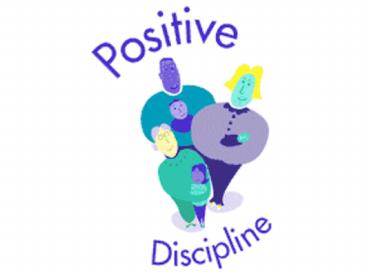How Positive Discipline works Throughout - PowerPoint PPT Presentation
Title:
How Positive Discipline works Throughout
Description:
'Don't hit the kitty.' Say... 'Touch the kitty gently.' Instead of... 'Stop kicking the table. Say... 'Keep your feet on the floor.' Harmful, Negative Disciplinary ... – PowerPoint PPT presentation
Number of Views:707
Avg rating:3.0/5.0
Title: How Positive Discipline works Throughout
1
(No Transcript)
2
- How Positive Discipline works Throughout
- Childrens lives.
3
What is Positive Discipline?
- Positive discipline or Gentle discipline
- is
- basically using positive tools to
- correct a childs behavior.
4
You have to learn how to deal effectively with
these types of students
- the attention demander the whiner the arguer
the bully the fighter the disrupter the
do-nothing the cheater the homework hater the
rebel the destroyer
5
Misbehavior can be thought of as an opportunity
for teaching new behavior.
- Instead of...
- "Don't hit the kitty."Say... "Touch the kitty
gently." - Instead of...
- "Stop kicking the table.
- Say... "Keep your feet on the floor."
6
Harmful, Negative Disciplinary Methods
- Criticizing, discouraging, blaming, using cruel
humor, or using physical punishment are some
negative disciplinary methods used with young
children. Often saying, "Stop that!" "Don't do it
that way!" or "You never..." is harmful to
children's self-esteem. - Such discipline techniques as removal from the
group, or isolation in a time-out chair or a
corner, may have negative consequences for the
child. - Stop using words that hurt.
- Start using words that help.
7
Remember
- The goal of discipline is not to
- control children and make them obey but
- to give them skills for making decisions,
- gradually gaining self-control, and being
- responsible for their own behavior.
8
Why Today's Children Are Different
9
- A child's world today is much larger than it was
in the past. There is greater access to
information. Children are much more aware of the
world around them. - This new society, with its new economy, demands a
different set of work skills, such as
interaction, innovation, negotiation and
communication.
10
FIVE BASIC NEEDS FOR EFFECTIVE DISCIPLINE
- The Need for Survival
- The Need for Love and Belonging
- The Need for Power
- The Need for Freedom
- The Need for Fun
11
The Need for Survival
12
- Knowing what will happen, in what order, is
crucial to their feelings of safety. - They have no way of expressing their feelings
directly or indirectly. As a result, they have to
defend themselves in any way possible - Escape, Act out, Bully other children, or try to
become the perfect child. - Failures bring them out, in full force.
- A few necessary, clear and reasonable rules give
children the security.
13
The Need for Love and Belonging
14
- . When we feel unloved and alone, we are
profoundly sad. - If we value our children's experience, they will
feel " There is something of value inside me. - There is no better anti-anxiety and
anti-depressant inoculation than this implicit
sense of worth. - They accept the inevitable frustrations and
defeats of life with grace and keep moving
forward.
15
The Need for Power
16
- we tend to think of power in a negative sense, as
power over other people. - The need for power is the need to feel that we
are in control of our own lives. - When you give students orders or commands, you
frustrate their need for power. When you give
them choices, you satisfy their need for power. - When students feel powerless, they attempt to
satisfy this need by disobeying rules (showing
they are more powerful than the person who set
the rules).
17
The Need for Freedom
18
- We are fortunate to live in a society with
considerable freedom, and we are free to make
countless choices every day. - When we talk about helping students learn about
responsibility, we are talking about giving them
the freedom to choose. - We can accomplish the same thing, making sure
work is completed, with either a threat or the
offer of a choice. - Offering a choice meets both their needs for
power and freedom and teaches them about
responsibility--it is their choice.
19
The Need for Fun
20
- When we are having fun, we relax, recharge our
batteries and enjoy a much-needed relief from the
pressures that surround us. - Watch children when they are at play. They are
constantly discovering, learning and having a
great time. - Sense of excitement and fun that accompanies the
learning.
21
- CHILDREN THE CHALLENGE































